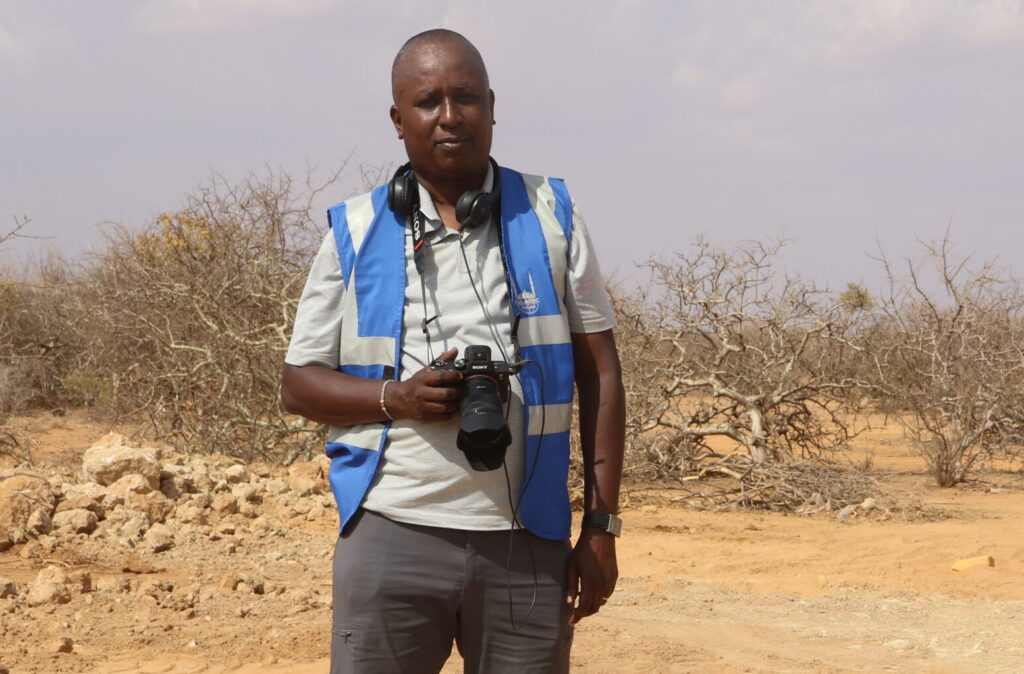
| As we look ahead to World Humanitarian Day on August 19, Charles Njanga, Islamic Relief’s Regional Media Creator for Africa, gives us a sense of what it’s really like to be a humanitarian worker in the region. |
What does it take to be a humanitarian worker? What are the qualities that one should have?
Many people think that it means having a well-paying job, paid in a foreign currency, and that you can work in jeans all year round. Hollywood shows glorified images of humanitarian workers where life is a continuous adventure like an Indiana Jones movie.
As the world marks the World Humanitarian Day this month, I want to look at the life of a humanitarian worker at Islamic Relief in the region where I work.
One of the endearing qualities of Islamic Relief is that we work in remote, hard-to-reach areas, sometimes where no other organisation is working. But what does this really mean and what does it take?
Working in remote areas
Some of the areas that Islamic Relief works in have only minimal social amenities. This means that there may be no electricity, water and sometimes a telephone network can be as rare as hen’s teeth. Just imagine a place with no WiFi! Many people would shudder at the thought of working in such a place.
I remember the first time I travelled to Hargelle District of Afdher Zone, Somali Region in Ethiopia. You first have to take a flight to Gode from Addis Ababa and then embark on a 6-hour drive on a rough road to Hargelle. There was no reliable telephone network and internet was only available at the Islamic Relief office. When in such a place, you are cut off from your family, who seem so far away. It is a surreal feeling like you are in another world, far away from the digital one we live in.
Being a humanitarian worker also means you may have to work in insecure areas. I want to remember colleagues in Sudan where fighting has been raging on since mid-April 2023. The staff at the country office in Khartoum had to be relocated to Gedarif State while others are in Egypt, Chad, and other countries.
Despite being displaced from their homes in Khartoum and other towns like Zalingei in Central Darfur, the Islamic Relief Sudan staff have continued serving people in need under quite difficult circumstances.
Everyday risk for staff
In Somalia, our staff in Mogadishu work in a dangerous environment where the risk of bombing is a daily occupational hazard. Our office there has borne the brunt of several bombings. Despite these daily risks, Islamic Relief staff in Somalia were able to reach an estimated 813,265 people in 2022 with vital aid and development projects.
In South Sudan, you will find Islamic Relief staff in remote areas such as Narus, Eastern Equatoria State.
The roads here are very bad or sometimes non-existent and one must sometimes make their way through the bush. The Narus Public Health Care Unit (PHCU) that is run by Islamic Relief is the only hope for hundreds of the area’s residents.
In Gourma Rharous, northern Mali, due to insecurity Islamic Relief staff are unable to even take photos of project activities using a camera because it is not safe to do so. Instead they resort to using their mobile phones to document project activities as it is less risky.
These are just a few examples, but they show the dedication of Islamic Relief staff working in very challenging environments. So, the next time you are reading a story from 1 of these areas, you will know what it takes to be a humanitarian worker for Islamic Relief.
Please continue supporting Islamic Relief so that we can reach more people in such areas. Donate now.
Charles is one of our regular bloggers. Each month, he’ll share stories of his work with Islamic Relief.
*Featured image: An Islamic Relief aid worker distributing food and survival items in Sudan
BROWSE OTHER OPINIONS
FEATURED OPINIONS
- Overwhelming reunions during the humanitarian pause in Gaza
- Connecting humanitarian, development and peacebuilding programmes: Lessons from Sida’s nexus conference
- On Tropical Cyclone Freddy: A sting to Malawi
- More than a word: How excellence is fuelling dignity and hope in Gaza this Ramadan
- Discussing humanitarian assistance
MOST POPULAR TOPIC
View More









